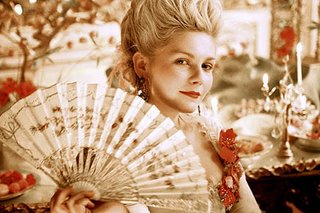Being Marie Antoinette
 God help us
God help usWe are too young to reign
-Louis XVI
Upon uttering this phrase, the tragic nature of Louis XVI's plight solidified in my heart. The scene takes place at the commencement of the third act in Sofia Coppola's latest film, Marie Antoinette. Until that moment, the impending death of Marie Antoinette had naively remained absent from my thoughts--a sleight of hand I credit to Sofia's diligent directing. Marie Antoinette is a film about lives existing within, or more appropriately, in spite of, the imposing customs of the aristocracy.
As way of demonstrating Marie's isolated existence in Versailles, the film presents an obsessively secluded account of her time in power. The filmic result is understandably varied. Much of the onscreen action focuses on the overindulgence of food and drink, and the exploration of vast gardens. These scenes play superficial to some, but are vital to the story of Marie Antoinette. Hers is a narrative of privilege, and of ignorance's high cost.
The most important moments of the film exist in the time between symbolic tradition. It is this background dialogue scattered throughout the film, which informs each character's true nature - outside of their aristocratic pose. The overlapping audio tracks made me immediately think of Robert Altman, who invented the concept of running multiple conversations simultaneously. Sofia adopts this ideal in her presentation of court gossip. It is purposely overwhelming for the audience, in order to give perspective on Marie's hostile surroundings.
While Louis is too weak to command the throne, Marie is too strong to submit to tradition, and collectively they are blind to the turbulent state of France. On paper the story is filled with drama, but Sofia consciously omits the majority of this action. No blood is shed onscreen, and the people of France are all but forgotten. This is a story of adolescence, and once it is suffocated by the outside world, the film is over.
Because of the bold stylistic and narrative choices made in the film, the soundtrack is the glue holding the entire production together. With a smile-inducing mix of 80's pop (and even my favorite Strokes songs), the soundtrack's warm tone meshes beautifully with the lush tapestry of 18th century France.
[mp3] Gang of Four - Natural's Not In It
[mp3] New Order - Ceremony
[mp3] The Cure - Plainsong
[mp3] The Strokes - What Ever Happened?
During the closing credits of the film, a gentleman behind me remarked, "I guess she must have missed a few chapters of the story." Although that reaction is understandable, it misses the subtle drama and focus found in Marie Antoinette. Cinema is not obligated to be a historical textbook. The point of cinema is to express theme and narrative without restriction. Sofia Coppola has stayed true to this in all three of her films, making her one of my favorite directors. Since the scope of Marie Antoinette is dramatically larger than her past work, the film does misstep occasionally. However, this is my only concession to the critics, because whatever Marie Antoinette lacks in precision, it easily makes up in ambition, heart and style.




2 Comments:
could not agree with you more. your words are perfect in describing what i felt when leaving the movie. to me the facial expressions and the music were all the drama needed and it made for a beautiful slice of life.
Thanks for the kind words. Glad you enjoyed the film as much as I did.
Post a Comment
<< Home